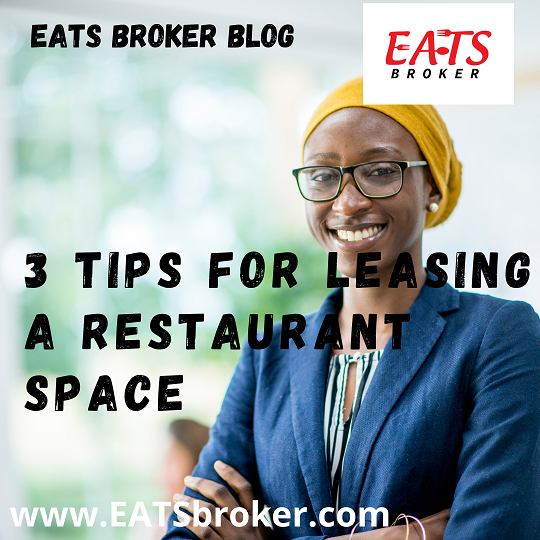3 Tips for Leasing a Restaurant Space
Restaurant leases can be complex and involve negotiations on some very important details to a lease. In general, restaurant commercial leases are generally much longer than a typical residential lease. The restaurant tenant is making a much larger financial commitment.
Regardless of whether you are an experienced restaurateur, franchise concept, or up-and-coming restaurateur, carefully review and consider the lease terms, and the language in the lease.
Even with the difficulty of negotiating lease terms, some restaurateurs try to negotiate with the landlord by themselves without professional representation. This practice sometimes leads to restaurant tenants signing lease agreements they fully don’t understand.
Leasing a restaurant can be a fairly straightforward process if you understand the steps required and seek help from a professional such as restaurant real estate advisors, attorney, contractors, and architects if you have questions. Finding a restaurant space can be the easy part, negotiating the lease terms can be the difficult part.
Restaurant Business Brokers 3 Tips for Leasing a Restaurant Space
Don’t Call that For Lease Sign
Unless you have experience in negotiating multiple commercial real estate leasing contracts, don’t call that For Lease Sign without contacting a trained Restaurant Broker. The individual who is advertising the commercial real estate space is a trained professional in contract negotiations representing the landlord’s best interest. Once you have called the For Lease Sign directly, you are letting the leasing agent know that you are representing yourself in negotiations.
Why is this important? Once the landlord’s representative starts negotiating with you and sends you a Letter of Intent and then you contact a Restaurant Broker to represent you it’s too late. The landlord will not pay your professional representative a commission and you will be responsible. This will be a personal expense you will incur and have to decide if you want to pay.
Most people don’t know the landlord pays the leasing company usually a 6% commission to lease the space. This commission is usually split between a tenant representative and a landlord representative in a co-op deal.
Be prepared with your documentation
Today’s leasing agents want to know they are working with a quailed tenant before they open the doors to show the space or start negotiating on a lease. The worst feeling as a potential restaurant tenant is to find the ideal and perfect space but you are not ready to move forward. Before you start your restaurant search, you should have the following items ready to present to the landlord if needed.
- Business Plan with 3 years forecast
- Copy of Menu
- Resume or Bio
- Proof of liquid assets-Bank Statement, 401K statement, or letter from your bank
- Personal Financial Statement
- Copy of Tax Returns
Prepare Letter of Intent
The first step of the lease negotiation is the offer to lease, typically referred to as the Letter of Intent (LOI). The Letter of Intent is to facilitate the start of negotiations between the tenant and the landlord. The complexity of the Letter of Intent depends on the person drafting the form, the tenant’s demands, and the landlord’s willingness to negotiate. This documentation should cover the majority of the key points to the lease:
- Rent structure
- Term of Lease
- Options to extend
- Permitted Use/Exclusive Use
- Rent Commencement Date
- Landlords Delivery Condition
- Lease Assignment Rights
- Tenant Improvement Allowance (TI)
- Rent Abatement
- Personal Guaranty
For more information on restaurant leasing and other available consulting services or restaurant valuations, contact Restaurant Business Broker Dominique Maddox at 404-993-4448 or by email at [email protected]. Visit our website at www.EATSbroker.com



